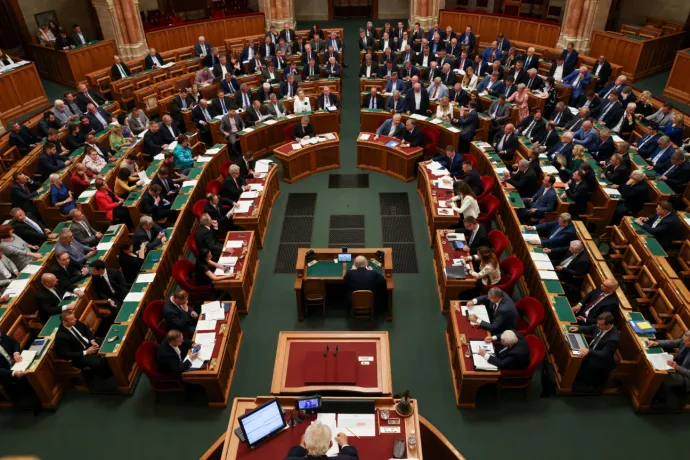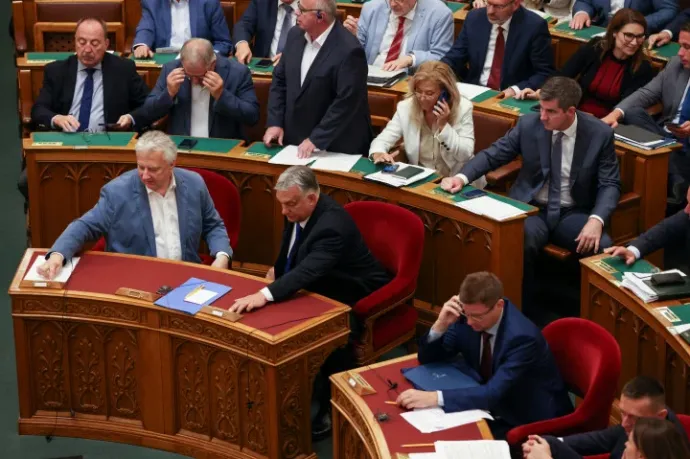"Vengeance law" adopted by Hungarian Parliament, country braces for mass resignations of teachers

The Hungarian Parliament has adopted the so-called status law which introduces changes in the education law and which is expected to further limit teachers' autonomy. The law has beeen referred to as the “vengeance law” in recent months, and will enter into force on 1 January 2024.
Before this happens, teachers will be informed that their status as public employees will be terminated and they will have to declare whether they wish to transfer to the status of public education employees, thus losing the protection granted by their previous status.
Since spring, when the law's draft became known, nearly five thousand Hungarian teachers have indicated that they will resign if the status law is adopted. Those who are not willing to sign the document about the status change will no longer be allowed to work as teachers in the public education system.
Additionally, educators who declare in writing that they do not accept the change of status between 15 and 29 September this year will receive only one month's severance pay in case of less than 20 years' service, two months' severance for having worked between 20 and 30 years and three months’ worth for more than that, all of which is considerably less than what they would have received if they had signed up for the new status.

How did we get here?
On 2 March, the Ministry of Interior (which is responsible for education) published the draft of the bill on the government's website. Teachers and students almost immediately took to calling it a "vengeance law". On 6 June, the Ministry of Interior submitted the draft to Parliament. On 16 June, opposition parties and the government debated the proposal for more than 18 hours, but there was no convergence in their positions.
A few days later, on 22 June, the Fidesz majority in the Committee on Culture adopted the final version of the bill. Although the opposition parties had tabled more than 40 amendments, all of them were voted down by the government members of the committee.
What does the Status Law contain?
But what does this law that has caused such a furor in recent months contain? Below are some of the main points:
The most important point of the status law is that it abolishes the status of public servant for teachers, and the government is instead introducing the status of "public education employee".
It allows for extending the school year (which in Hungary traditionally ends around mid-June -TN) until 15 July in the event that covering the curicculum required was not possible “due to unforeseen and unavoidable circumstances”.
In addition, the maintaining authority may temporarily designate a different "place of activity" if for some reason the operation of a public school cannot be guaranteed. This means that teachers and even students may be temporarily transferred to another school.
Both changes could be a response to the more than a year and a half of protests by teachers, as the amendments will definitely make strikes and civil disobedience even less meaningful. Government members of the National Assembly's legislative committee later included a softening in the latter change, proposing that a teacher could only be transferred to another school within their school district until the end of the term and without their consent "if the time spent travelling between the new place of assignment and the place of residence by public transport does not exceed three hours a day" and if no volunteer was found for the post among their colleagues.
It is also clear that according to the law, in the future, the institutions themselves and their teaching staff will have fewer rights in matters concerning their schools and more rights will be given to the maintaining authority.
For example, the board of teachers from each school used to be the one to decide on the adoption of the pedagogical programme, but from now on, they will only be able to give their opinion, while the decision will be taken by the maintaining authority.
The law also stipulates that the daily total hours worked by teachers may exceed 8 hours, with the exception that the total hours worked may not exceed 12 hours and the weekly total hours not exceed 48 hours.
Another much criticized point in the bill is the one about the number of hours a teacher may spend substituting each week. The limit for this used to be 55-65 percent of the total hours worked. However, once the bill has entered into force, the employer may unilaterally order additional substitutory teaching for any reason for up to a maximum of 110% of the teacher's hours.
This is seen by many as a response to many teachers having quit recently and also to the strikes and acts of civil disobedience that have occurred throughout the country over the past year.
Protests against the bill have been going on for months
Professional organizations and interest groups have been protesting against the introduction of the law for months, and once the draft was published, students, teachers and parents organized several protests to call for its withdrawal. The draft bill was dubbed the "vengeance law" early on, because critics believe the government is seeking revenge by stripping teachers of their status as public employees, making strikes impossible and banning freedom of expression.

According to the teachers' unions, the status law doesn't include their original strike demands: for example, an immediate, large-scale pay rise and a reduction in their workload. They also criticized the lack of meaningful, professional conciliation before the law was passed. For example, during a discussion on the problems within public education Olivér Pilz, a member of the movement 'I'd like to teach' said: “The new status law only increases the workload of teachers and covers up the shortage of teachers by substitute teaching. This law will run teachers into the ground, when they are already in a very bad state of mind.”
“A new status law which further strips educators of their autonomy is not what is needed. Instead, we need education reforms based on broad social consultation.”
– the Teachers’ Democratic Trade Union (PDSZ) said in an earlier statement.
The government claims the goal is to give recognition to teachers
All along, the Orbán government has claimed that the changes will make things better for teachers, which is why they don't expect mass resignations as a result of the status law. They have also often said that the opposition is using the status law and the protests against it for political gain, and doesn't really care about the interests of teachers.
According to the Ministry of Interior, the new education bill aims to improve the social, professional and financial standing of teachers and educators. State Secretary Bence Rétvári told MTI (the Hungarian State News Agency) that the most important objective is to give recognition to the teaching profession and to provide teachers with an independent legal status tailored to their activities, just like that of doctors and nurses. The second objective is to create the basis for a pay rise.
The ministry denied that there had been no substantive consultation on the law, with State Secretary Zoltán Maruzsa telling parliament on Monday that the draft had been discussed 20 times. Bence Rétvári said that they had "gone through the proposal paragraph by paragraph" with the teachers' unions.
The teachers’ union representatives had a very different report following one of their very few conciliatory meetings with government representatives on the law, saying that “Professional organizations weren't given a say in the discussions, and Interior Minister Sándor Pintér spoke only to representatives of the political parties.”
For more quick, accurate and impartial news from and about Hungary, subscribe to the Telex English newsletter!